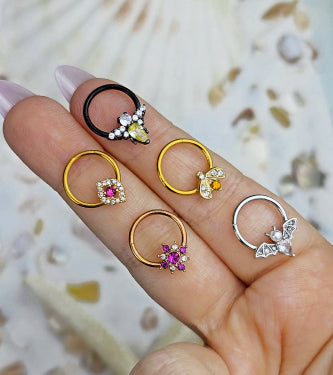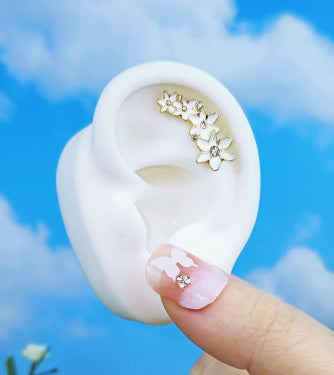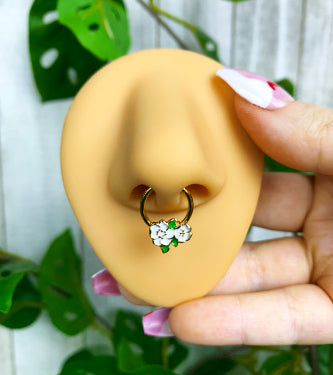Everyone’s had that moment where they decide to remove their jewelry and give it a good cleaning. This doesn’t always end well – lost gems, warped jewelry, damaged jewelry. What went wrong? Is it the jewelry? Is it your cleaning method? Is it some horrible, jewelry-eating monster? Odds are, it’s your cleaning method. So, let’s take a moment to discuss how to clean (and how NOT to clean) your body jewelry.
As we know, not all jewelry is made the same way or with the same materials. It’s very important that you clean your jewelry in a way that is appropriate for the material. For example, alcohol will not harm uncoated titanium. Apply the same rubbing alcohol to acrylic, and you are going to likely end up throwing that jewelry in the trash. If you want your jewelry to last, you have to use appropriate products on that specific material.
Cleaning DON'T #1...
Wearing your jewelry in the shower is not a proper way to clean it. Hard water, shampoo, and other chemicals can damage it. This would not apply to titanium or gold, but materials like acrylic, silicone, or stone can definitely take a beating from your body wash. Also, the hot water can cause gems to loosen in their settings and eventually fall out. So, cross this one off your list, it’s not the best method to use.
Cleaning DON'T #2...
Another no-no for jewelry cleaning would be harsh household cleansers. Substances such as bleach, alcohol, and other household cleaning products may do a fantastic job on your sinks and counters, but they will also do a fantastic job of destroying your jewelry. Some more things to avoid include vinegar and lemon juice. Everyone loves a DIY solution to a problem, but only if it gets good results. Damaged finishes and marred gems are not on anybody’s “want” list. A good rule of thumb – if it stings the skin, it’s not meant to be used on your body jewelry. And since we’re discussing harsh chemicals, chlorinated pool water will also not clean your jewelry. It will only shorten your jewelry’s lifespan. If you’re going swimming, take it out or replace it with something simple and basic like plain titanium.
Cleaning DON'T #3...
A popular method for cleaning jewelry at home is to use toothpaste and a toothbrush. This may work or it may not but there’s no way to be sure in advance. Abrasives in the toothpaste or the harsh bristles of a toothbrush can easily scratch fragile gems or jewelry. Another popular method is boiling water – a recipe for potential damage. The high degree of heat can warp jewelry, can loosen gems, can even partially melt jewelry if it’s left in for a long time. A quick dip in hot water to loosen debris from the jewelry is safe. Leaving it in a pot on the stove to boil like a can of soup is going to leave you with a big bowl of Damaged Jewelry Stew.
Cleaning DO...
So now that we’ve gone over how NOT to clean your jewelry, let’s take a quick moment to discuss the best way to clean your jewelry without destroying it. It’s shockingly simple – warm water and gentle soap – for example, Ivory, castille soap, Dawn dish soap, etc. If you can clean a duck with it, you can clean your nose ring with it! Simply take the jewelry in your hands, moisten it with warm water and then give it a good wash with the gentle soap of your choice. When finished, dry it gently and thoroughly with a paper towel, and then give it a going over with a polishing cloth to bring back that sparkle that made you fall in love with it in the first place.
Now you know everything you need to about cleaning your body jewelry. There is no excuse for walking around with grubby jewelry in. Go grab some soap and cleaning! Happy piercing!






